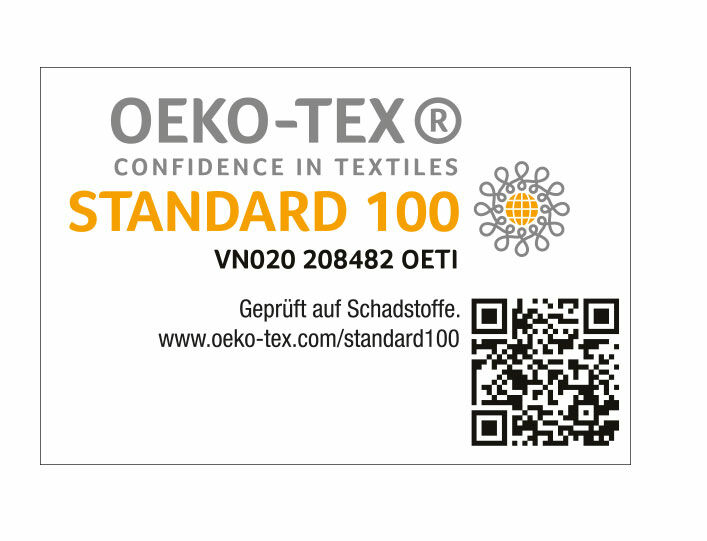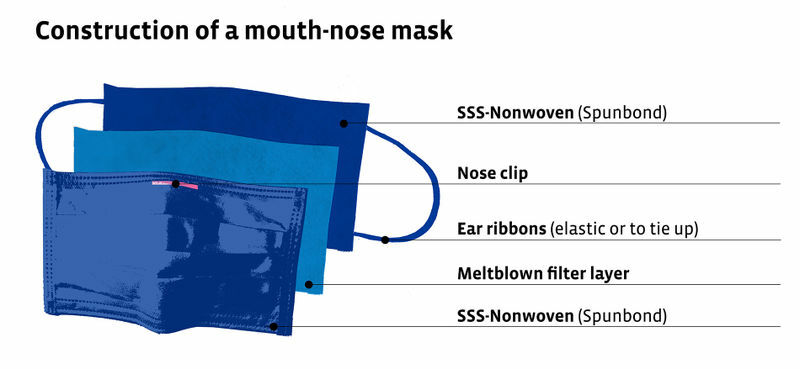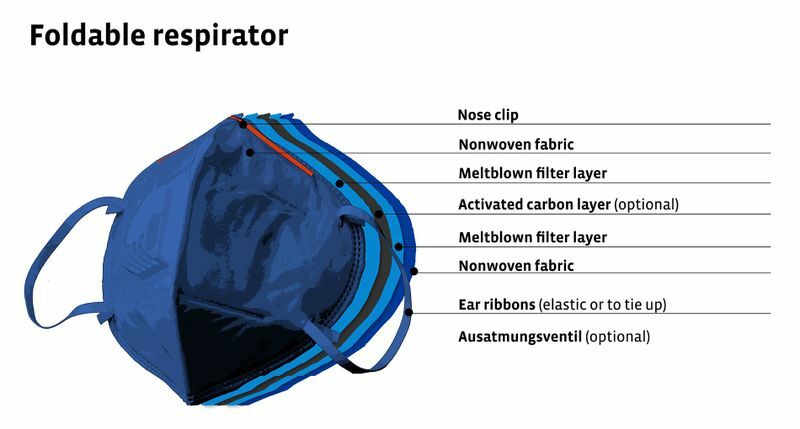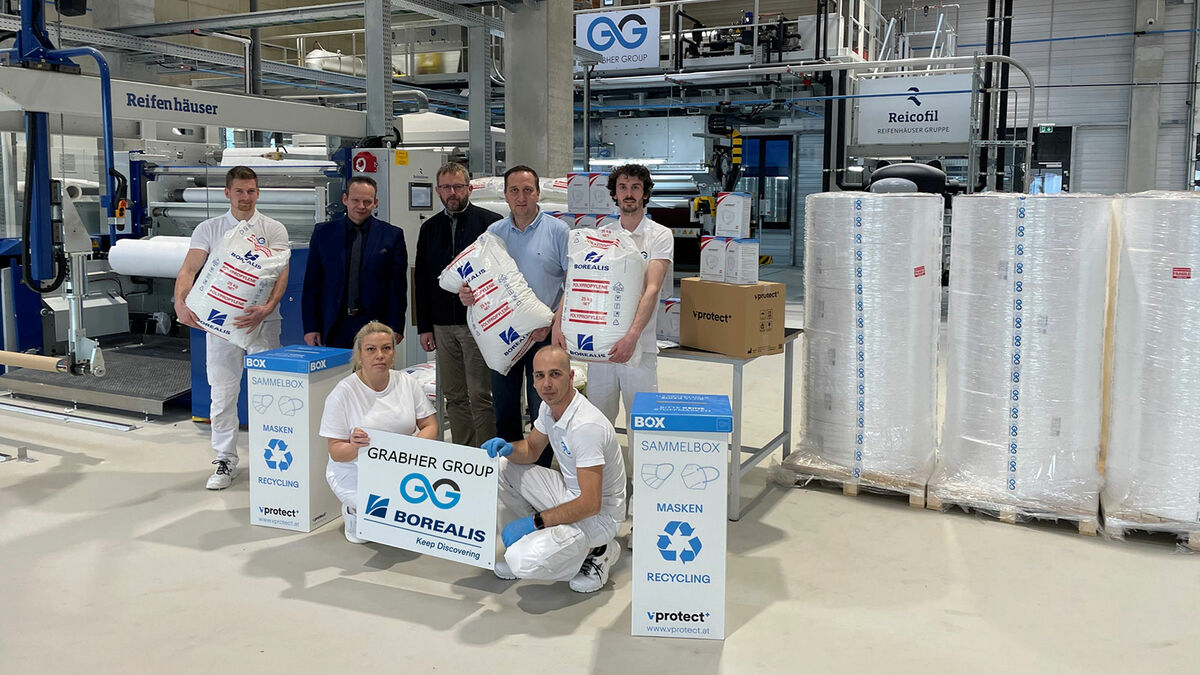
Sustainable face masks: recyclable and climate-friendly
FFP2 masks have been difficult or impossible to recycle. As a consequence, they end up in the trash. The resources are lost to the circular economy and this leads to a disastrous climate footprint. The Austrian Grabher Group, one of the leaders in the field of technical and medical textiles, has now developed the world's first face mask made of 99.7% polypropylene using technology from Reifenhäuser and a low-emission feedstock from Borealis. This is fully recyclable, climate-friendly, and is already certified by the CE marking and the Ökotex STANDARD 100 label.

Coronavirus pandemic was the starting point
At the beginning of the coronavirus pandemic, the Grabher Group - like many companies in Europe - started with the production of protective face masks. "It was very important to us to produce high quality as fast as possible and with high line availability," says company founder and CEO, Günter Grabher. That's why the company opted for a meltblown line from Reifenhäuser. "From our point of view, Reifenhäuser simply has the most experience in meltblown line technology," says Grabher.
As early as the start-up of domestic face mask production, the Grabher Group began to think about the end-of-life of face masks. "We have been involved intensively with the circular economy for many years. That's why we consider this aspect when we develop new products or think about how we can adapt products that are not yet recyclable," emphasizes CEO Grabher. For example, many of the company's textile products are already recyclable according to the cradle-to-cradle principle, meaning they can be completely returned to the textile cycle.
Cradle to Cradle
Cradle to Cradle refers to a standard promoting the systematic implementation of a complete circular economy. In other words, feedstock is recycled multiple times into products of similar quality in order to remain continuously within the circular economy.
Material mix poses a problem for recycling
When it comes to recycling, however, FFP2 masks pose major problems. They usually consist of many different plastic materials, for example, function layers made of polypropylene and polyethylene, nose clips made of metal, and ear loops made of polyester. Grabher has nevertheless developed a collection and recycling system together with the company Borealis and this system has already become established in Austria. The principle is very simple. Worn masks are collected in special containers in hospitals, for example, returned to Grabher by mail, and recycled.
But the recycling process has a catch: It is very time-consuming. "We have to separate the individual parts of the masks from each other by hand and then feed them to different recycling cycles," says Günter Grabher. "That takes a lot of time and is not economical."


The solution: recyclable monomaterial masks.
That's why the Grabher Group is now taking a new approach and has developed a mask made entirely of polypropylene to achieve improved recyclability. "Monomaterial products are easier to recycle," Günter Grabher tells us. "We succeeded in replacing the parts that were not made of polypropylene." For example, they replaced a mask layer previously made of hot air cotton to provide the necessary stability by a pure polypropylene layer. All key components of the mask - the nonwoven layers - are now made of fully recyclable polypropylene (PP) made by Borealis.
The function layers of the FFP2 masks are produced on Reifenhäuser lines. "As the world's leading supplier of nonwoven lines, we have the necessary know-how and the appropriate technology to produce the outer layers and the crucial filter material," says Andreas Rösner, Strategic Product Development at Reifenhäuser Reicofil.
These mask parts were replaced
The line produces consistently high quality, sufficient for a filtration efficiency of 99% (N99 / FFP3 standard), and high line availability, as Günter Grabher confirms from practical experience: "Our expectations have been fulfilled: The quality is right and the line has been running smoothly since the first day of commissioning. It doesn't get any better."

Recyclable FFP2 masks
Sorting quality is vital Grabher also has an answer to a second major challenge facing the recycling of masks. In order for masks to become new filter feedstock according to the Cradle2Cradle principle, a certain degree of sorting quality is vital. This is why Grabher relies on the collection and return system already tried and tested for conventional masks. The collected monomaterial masks, made of fully recyclable polypropylene (PP), can be immediately regranulated without further processing after hygienic UV cleaning.
Ensure traceability
A genuine circular economy for plastic packaging requires a traceability standard to acquire all recycling-related data from the production process in the form of a digital product passport. Reifenhäuser is a member of the cross-industry consortium R-Cycle that is working on an open and globally applicable traceability standard.
The recyclate is then processed on Reifenhäuser lines to produce the various function layers of FFP2 masks. However, the properties of the raw material are modified during recycling. For example, the melt flow index (MFI), i.e. the flow characteristics of the plastic, decreases. The higher the MFI, the finer the fibers produced. "For the filter layers of the mask, we need a high MFI for the very fine filaments," explains Günter Grabher. He adds, "That's why the recycled content for filter layers is 15%. On the other hand, the outer nonwoven layers do not require such fine fibers. They are therefore made from 100% recycled feedstock."
Reducing the carbon footprint
But that’s not all. Sustainable FFP2 masks are not only fully recyclable, their production also generates significantly lower CO2 emissions than conventional protective face masks. "Climate neutrality is important to us, not only in terms of our responsibility to the environment, but it also means assuming an increasingly important role in complying with regulations, such as those imposed by EU taxonomy," says Günter Grabher.
The Grabher Group has therefore geared its entire production process to achieving the lowest possible carbon footprint. For example, the company avoids long transport routes and manufactures masks entirely at its site in Lustenau (Austria). The feedstock used is an ISCC PLUS certified polypropylene made by Borealis based on The Bornewables™: These premium polyolefins are produced from renewable feedstock derived entirely from waste and residue streams, offering the same material performance as virgin polyolefins, while having a significantly smaller carbon footprint.
The face mask nonwoven is produced with green power on energy-efficient line technology from Reifenhäuser. "Our line technology efficiently processes the feedstock into nonwoven," says Rösner. To achieve this, however, it is important that the line operates at optimum capacity - because recycled stock is somewhat more complex to process than virgin material. "Here, we had and continue to receive a lot of support from the experts at Reifenhäuser," says Günter Grabher.
In mathematical terms, a recyclable FFP2 mask therefore has a carbon footprint of 8 grams of CO2 equivalent - i.e. one tenth of a conventional mask produced in Asia.

Combining sustainability and profitability
Sustainable FFP2 masks available in Fall 2022. The first target groups for the climate-friendly recycling solution are healthcare facilities, companies, and trade shows. At trade shows, for example, masks could be handed out at the entrance and thrown into appropriate collection bins when people leave the trade show. A first test run will take place at K 2022, the world's leading trade fair for plastics, from October 19 to 26 in Düsseldorf. "Basically, our system can be used wherever it is guaranteed a large percentage of the masks is returned,” says Grabher. "Ultimately, we have developed a circular economy application that is not only sustainable, but also works profitably."